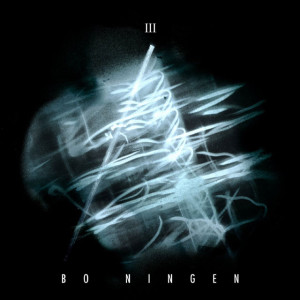Bo Ningen have made "a sound" out of not having one, or rather via a saturation of gloriously overwhelming noise and ideas that converge in an organised, yet frantic way. In fact, "frantic" may be the best description for much of Bo Ningen’s style, and never has it been more applicable than on the foursome’s latest record III.
These Japanese-born, London-based psychedelic-rockers/acid-punks/whatever-you-want-to-call-ems knocked the critics spinnin’ with their 2010 eponymous debut and continue to crumble the cochleas of the UKs braver gig-goers with their ferocious and eccentric live performances. 2012’s Line The Wall saw them not so much hone their craft as expand it – with III further following suit. This album is bigger, grittier and their most challenging listen yet.
Though it’s clear that the band have backed off of their effects somewhat, the range of vocal styles over the record is astounding; frontman Taigen Kawabe doesn’t appear to limit himself to any particular timbre or projection. There is growling, shrieking, belting and borderline rapping. His bass playing is just as varied – sometimes distorted, sometimes smooth and rounded and other times slapped in sharp staccato. Similarly, the rest of the band are open to any manner of effect and style of playing. There is no member that you can pin down to a favourite effect or approach, yet somehow III manages to sound familiar.
One of these recognisably Bo Ningen sounds has to be Kawabe’s hysterical, shrieking, squeaking clipped vocals that have always been smattered about the band’s work. The sound I imagine a chinchilla would make had it the ability to bark at a one man band falling down the stairs onto a busy train platform. It’s the sound that opens the album on ‘DaDaDa’, a tune that may be referred to as a "pop nugget" though only in the context of the band’s body of work. It’s difficult to listen to, but mercifully seems to only appear as a sort of garnished punctuation over his other adventurous tones.
The big surprise comes from the nine-minute ‘Mukaeni Ikenai’, which is soft, yet unpredictable. It stands out not only on the record, but among the band’s catalogue. A total change of pace, it at times it resembles Suede’s ‘Sleeping Pills’, Kawabe’s vocals sometimes hush to a whisper and fall languidly out of rhythm in a trance-like way. ‘Ogosokana Ao’ follows in a similar subtle mould, with a smooth, rolling bassline with interspersed guitar riffs that ride the tide and sound like they are run backwards at times. Kawabe has more effects on his voice here than over the whole of the record, which adds to the atmospheric and lazy-river ride effect.
‘CC’ comes in like a double-kicking speed metal gallop and rounds up with a sonic battering ram that would knock Black Sabbath off their laurels. The English lyrics – III is the first Bo Ningen album to include them – add another dimension to the record, but also bring the contrast between the rhythm and flow of the languages into sharp focus. This track in particular wanders from the consistency on the rest of the record – though this may be in part down to the vocal contribution of Savages’ Jenny Beth. ‘Maki-Modoshi’ – a huge highlight – is made up of a thunderous drone for the first minute of the song after which gears shift wildly into weird acid funk overlaid with the most interesting melodic line on the album. It ends in another type of drone, but one of viscous feedback drowning the squeals of tens of Kawabes.
While it’s obvious that the band have thought things through a bit more on this runaround, many tracks still have that jammed-out feel, such as ‘Inu’ which is based mostly around a two-note, pendulum bass line. It’s as if they give themselves a small box to work within, but then go on to furiously bust the lines with swirls and stabs of colour. It’s tempting to assume that the box – call it psychedelic rock, acid punk or what you may – is their base of operations, but it’s really not that simple. Bo Ningen will take your labels and whirl their chaotic vortex right through it, leaving splinters and eviscerated expectations in their wake.


